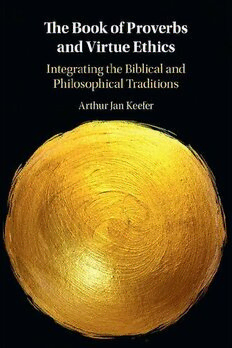
The Book of Proverbs and Virtue Ethics PDF
Preview The Book of Proverbs and Virtue Ethics
The Book of Proverbs and Virtue Ethics Inthisbook,ArthurJanKeeferoffersanewinterpretationofthebook of Proverbs from the standpoint of virtue ethics. Using an innovative method that bridges philosophy and biblical studies, he argues that much of the instruction within Proverbs meets the criteria for moral andtheologicalvirtueassetoutinAristotle’sNicomacheanEthicsand theworksofSt.ThomasAquinas.Keeferpresentsthemoralthoughtof Proverbs in its social, historical, and theological contexts. He shows how these contexts shed light on the conceptualization of virtue, the virtues that are promoted and omitted, and the characteristics that makeProverbsadistinctivemoraltradition.Ingivingundividedatten- tion to biblical virtue, this volume opens the way for new avenues of study in biblical ethics, including law, narrative, and other aspects of biblicalinstructionandwisdom. Arthur Jan Keefer is a schoolmaster and chaplain at Eton College, where he teaches theology, philosophy and religion. He is also the author of Proverbs 1–9 as an Introduction to the Book of Proverbs (BloomsburyT&TClark,2020),alongwithnumerousjournalarticles, and is coeditor of The Cambridge Companion to Biblical Wisdom Literature(forthcoming). The Book of Proverbs and Virtue Ethics Integrating the Biblical and Philosophical Traditions ARTHUR JAN KEEFER EtonCollege UniversityPrintingHouse,Cambridgecb28bs,UnitedKingdom OneLibertyPlaza,20thFloor,NewYork,ny10006,USA 477WilliamstownRoad,PortMelbourne,vic3207,Australia 314–321,3rdFloor,Plot3,SplendorForum,JasolaDistrictCentre, NewDelhi–110025,India 79AnsonRoad,#06–04/06,Singapore079906 CambridgeUniversityPressispartoftheUniversityofCambridge. ItfurtherstheUniversity’smissionbydisseminatingknowledgeinthepursuitof education,learning,andresearchatthehighestinternationallevelsofexcellence. www.cambridge.org Informationonthistitle:www.cambridge.org/9781108839778 doi:10.1017/9781108885119 ©CambridgeUniversityPress2021 Thispublicationisincopyright.Subjecttostatutoryexception andtotheprovisionsofrelevantcollectivelicensingagreements, noreproductionofanypartmaytakeplacewithoutthewritten permissionofCambridgeUniversityPress. Firstpublished2021 AcataloguerecordforthispublicationisavailablefromtheBritishLibrary. LibraryofCongressCataloging-in-PublicationData names:Keefer,ArthurJan,1987–author. title:ThebookofProverbsandvirtueethics:integratingthebiblicalandphilosophical traditions/ArthurJanKeefer,EtonCollege. description:Cambridge,UnitedKingdom;NewYork,NY,USA:CambridgeUniversity Press,2021.|Includesbibliographicalreferencesandindex. identifiers:lccn2020013849(print)|lccn2020013850(ebook)| isbn9781108839778(hardback)|isbn9781108813716(paperback)| isbn9781108885119(epub) subjects:lcsh:Bible.Proverbs–Criticism,interpretation,etc.|Aristotle.Nicomachean ethics.|Thomas,Aquinas,Saint,1225?–1274.|Virtue.|Ethics. classification:lccbs1465.52.k442021(print)|lccbs1465.52(ebook)| ddc241/.4–dc23 LCrecordavailableathttps://lccn.loc.gov/2020013849 LCebookrecordavailableathttps://lccn.loc.gov/2020013850 isbn978-1-108-83977-8Hardback CambridgeUniversityPresshasnoresponsibilityforthepersistenceoraccuracy ofURLsforexternalorthird-partyinternetwebsitesreferredtointhispublication anddoesnotguaranteethatanycontentonsuchwebsitesis,orwillremain, accurateorappropriate. For my parents Contents List of Tables page viii Preface ix Note on Texts and Translation xi List of Abbreviations xii 1 Introduction 1 2 Views of Virtue in Philosophy 14 3 Moral Virtues inProverbs 42 4 Honor,Shame, Humility, and Pride 93 5 Courage, Work, Speech, and Friendship 120 6 Theological Virtues in Proverbs 158 7 Moral Agents and the Presentation of Virtue 201 Bibliography 222 Index of AncientSources 231 Index of Authorsand Topics 244 vii Tables 3.1 Aristotle’smoral virtues page 50 3.2 Moral virtuesin Proverbs 59 3.3 Passages for moral virtuesin Proverbs 60 3.4 The virtueof liberality 70 4.1 Comparison of proverbialand Aristotelian virtues 97 6.1 Theological virtues 167 viii Preface This book began as a side project during my doctoral studies at the University of Cambridge and soon became much more than that. It resulted inan accretion of disciplines – classical studies and some histor- icaltheology,inadditiontomynativebiblicalstudies–thatcanproduce results which are more problematic than productive. Disciplines can clash, and there is a high risk of anachronism and exegetical contortion when attempting to bridge ideas from various times or cultures, all of whichisfurthercomplicatedwhentheseideasseemtobethepropertyof modern, segregated, academic disciplines. But, as a part of a long- standing relationship between the Bible and philosophy, something has broughteachoftheseintereststogether,andthatthingisvirtue.Theword itselfmaysoundfashionable,andthesamecouldbesaidofseveralothers found in the book’s title – “virtue ethics” and the “integration” of multiple disciplines. But be assured that this subject is not a fad, if not chiefly because theologians and biblical scholars from antiquity, and increasingly so in the modern period, have been adamant that biblical andphilosophicalmaterialswerenotalwaysatoddsbutevensometimes in harmony. For if there is something artificial about interdisciplinary work, there iscertainlynothing modern about it. I owe special thanks to Drs. Richard Oosterhoff and Jon Thompson for introducing me to several good books, without which the current project would have been unimaginable. Beatrice Rehl, at Cambridge University Press, received a draft of this work with serious consideration andhasnotceasedtobeencouraging.Essentialalsoweretwoanonymous and conscientious reviewers, who improved my argument in several places,andtheeffortsofEricChristianson,whohelpedwithmanystages ix
